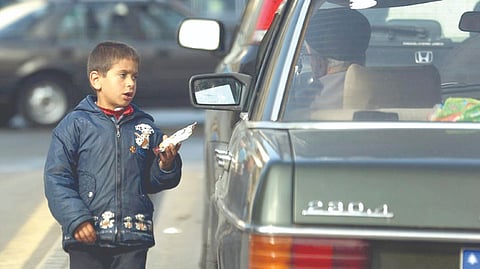

WASHINGTON: Lebanon’s capital Beirut has turned into a city of contrasts. Expensive cars park before popular restaurants and bars, while people of all ages rummage through bins for something edible.
“Also, more and more people are begging in the streets, mainly children but also elderly people,” Anna Fleischer, head of the German Heinrich Böll Foundation’s office in Beirut, told DW.
While it is hard to tell the nationality, “it can be assumed that there are many Syrian refugees, but also Lebanese,” she added.
Years of political instability in combination with an ongoing economic crisis — exacerbated by the Covid pandemic and the Port of Beirut blast in August 2020 — have brought the country close to collapse.
Lebanon ranks not only “among the most severe crises globally since the mid-19th century,” according to the World Bank, but it is also likely that “an unprecedented institutional vacuum will further delay any agreement on crisis resolution and critical reform ratification, deepening the woes of the Lebanese people,” the World Bank report says.
Following years of massive economic contraction, in combination with a 95% devaluation of its currency, the Lebanese middle class has practically vanished. In March 2020, the World Bank devalued Lebanon to a lower-middle income country.
“A person that is earning 1,500,000 Lebanese pounds used to have an equivalent of $1,000 before the crisis, and now it is equivalent to less than $200,” Hussein Cheaito, a development economist at The Policy Initiative, a Beirut-based research center, told DW. In a recent publication on rising hunger and poverty in Lebanon by Human Rights Watch (HRW), Lena Simet stated that “millions of people in Lebanon have been pushed into poverty and have cut back on food.” The senior economic justice researcher at HRW pointed to worrying trends of food insecurity in the lowest bracket of earners.
Similarly, a September report on food insecurity in the Middle East by the independent research network Arab Barometer found that nearly half of all citizens in Lebanon stated that they ran out of food before they had money to buy more.
Meanwhile, there are no indications for change, and the tax system is not helping the overall situation in Lebanon.
“The taxation system in Lebanon is highly regressive, which means that there is no wealth tax code, and corporate taxes are amongst the lowest in the world compared to all OECD averages,” Hussein Cheaito told DW.
The beneficiaries of the taxation system are those of the “political class and their business connections, because this 1% owns more than 70% of the national income,” Cheaito said. This, in turn, leaves a very small percentage of wealth to the rest of the society,” he claims.
Furthermore, those who earn their wages in Lebanese pounds, or receive support via charity organizations, suffer from another disadvantage. Banks only offer limited cash withdrawals in US dollars to those who have US dollars in their accounts.
Also, for the past 20 years, Lebanese banks have kept the pegged exchange rate of $1 to 1,500 Lebanese pounds. This, however, will be updated to $1 to 15,000 pounds on February 1. Even though this is 10 times more than before, it is still far from the actually used exchange rate on the black market. The current rate ist 50,000 pounds to the dollar.
Visit news.dtnext.in to explore our interactive epaper!
Download the DT Next app for more exciting features!
Click here for iOS
Click here for Android